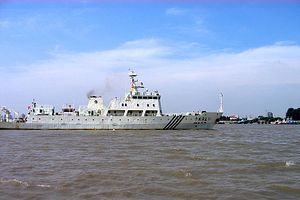The Philippine government has accused Chinese vessels of aggressive and irresponsible behavior near Scarborough Shoal, a disputed territory in the South China Sea. Scarborough Shoal was the site of a lengthy 2012 confrontation between Chinese and Philippine government vessels. Since the Philippine ships withdrew in June 2012, ending the standoff, China has effectively occupied the area.
In a statement posted to the website of the Philippines’ Department of Foreign Affairs, the DFA said it had submitted two protest notes to the Chinese Embassy in Manila “in connection with recent incidents in the Philippines’ Bajo de Masinloc” (the Philippine name for the Scarborough Shoal).
First, the Philippines claimed that three Philippine fishing vessels (the OG Barbie, the Ocean Glory 2, and the Ana Marie) “were intentionally rammed by Chinese Coast Guard Vessel 3412” on January 29, “causing damage to the vessels and endangering the lives and safety of the Filipino fishermen on board.” Manila claims that its fishermen “have been routinely, continuously, peacefully and sustainably fishing” in the Scarborough Shoal and should not prevented from continuing to do so. According to Reuters, Philippine coast guard official have described this incident as the most serious confrontation yet between Philippine fishing vessels and the Chinese coast guard.
Second, the Philippine Coast Guard (PCG) accused Chinese utility boats and fishing vessels collecting and transporting giant clams in the Scarborough Shoal lagoon. “The act of harvesting giant clams, which are among the most endangered marine species, entails the crushing and destruction of surrounding corals which result in the permanent destruction of the reef itself,” the DFA statement said, accusing China of violating international commitments by supporting “the environmentally harmful fishing practices by its nationals” at Scarborough Shoal.
This is not the first time the Philippines has accused Chinese fishermen of poaching environmentally protected species. Last year, a Philippine court sentenced 12 Chinese fishermen to prison after the men were arrested in the Philippines’ Sulu Sea. In addition to illegally fishing in Philippine territorial waters, the fishermen were found to be carrying pangolins, an endangered mammal. More controversially, the Philippines arrested a Chinese fishing crew in May 2015 in a disputed area near the Spratly Islands, saying the men were found carrying some 500 sea turtles, including protected species. Even the 2012 Scarborough Shoal standoff involved accusations from the Philippines that the Chinese fishermen were in possession of protected species, including giant clams, coral, and sharks.
The Philippine protests are the latest manifestation of Manila’s strategy to draw international attention to China’s ‘bad behavior’ in the South China Sea. Most notably, the Philippine government filed a suit against China’s South China Sea claims with an international tribunal. Manila has also publicized China’s land reclamation activities in the South China Sea, posting before-and-after satellite photos to the DFA website.
As the Philippines does not currently have the naval strength to counter Chinese activities in disputed areas (something Manila wants to change), it has instead opted for a “name-and-shame” strategy, frequently drawing attention to China’s behavior in the South China Sea. Manila can’t match China when it comes to maritime capabilities, but it can work to make sure China’s South China Sea claims come up at every regional meeting — much to Beijing’s annoyance.






























